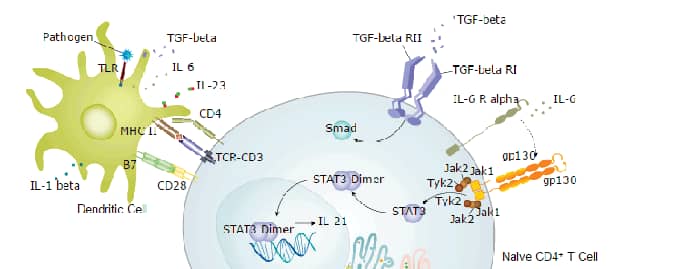Canine IL-6 Antibody Summary
Thr23-Met207
Accession # P41323
Applications
Please Note: Optimal dilutions should be determined by each laboratory for each application. General Protocols are available in the Technical Information section on our website.
Scientific Data
 View Larger
View Larger
Cell Proliferation Induced by IL‑6 and Neutralization by Canine IL‑6 Antibody. Recombinant Canine IL-6 (Catalog # 1609-CL) induces proliferation in the T1165.85.2.1 mouse plasmacytoma cell line in a dose-dependent manner (orange line), as measured by Resazurin (Catalog # AR002). Proliferation elicited by Recombinant Canine IL-6 (50 ng/mL) is neutralized (green line) by increasing concentrations of Mouse Anti-Canine IL-6 Monoclonal Antibody (Catalog # MAB16092). The ND50 is typically 1-5 µg/mL.
Reconstitution Calculator
Preparation and Storage
- 12 months from date of receipt, -20 to -70 °C as supplied.
- 1 month, 2 to 8 °C under sterile conditions after reconstitution.
- 6 months, -20 to -70 °C under sterile conditions after reconstitution.
Background: IL-6
Interleukin 6 (IL-6) is a pleiotropic alpha -helical cytokine that plays important roles in acute phase reactions, inflammation, hematopoiesis, bone metabolism, and cancer progression. IL-6 activity is central to the transition from acute inflammation to either acquired immunity or chronic inflammatory disease. It is secreted by multiple cell types as a 22‑28 kDa phosphorylated and variably glycosylated molecule (1‑4). Mature canine IL-6 is 187 amino acids (aa) in length and shares 76%, 59%, 38%, and 40% aa sequence identity with feline, human, mouse, and rat IL-6, respectively (5). IL-6 induces signaling through a cell surface heterodimeric receptor complex composed of a ligand binding subunit (IL-6 R) and a signal transducing subunit (gp130). IL-6 binds to IL-6 R, triggering IL-6 R association with gp130 and gp130 dimerization (6). gp130 is also a component of the receptors for CLC, CNTF, CT-1, IL-11, IL-27, LIF, and OSM (7). Soluble forms of IL-6 R are generated by both alternate splicing and proteolytic cleavage (3). In a mechanism known as trans-signaling, complexes of soluble IL-6 and IL-6 R elicit responses from gp130‑expressing cells that lack cell surface IL-6 R (3). Trans-signaling enables a wider range of cell types to respond to IL-6, as the expression of gp130 is ubiquitous while that of IL-6 R is predominantly restricted to hepatocytes, leukocytes, and lymphocytes (3). Soluble splice forms of gp130 block trans-signaling from IL-6/IL-6 R but not from other cytokines that utilize gp130 as a co‑receptor (4, 8).
- Van Snick, J. (1990) Annu. Rev. Immunol. 8:253.
- Hodge, D.R. et al. (2005) Eur. J. Cancer 41:2502.
- Jones, S.A. (2005) J. Immunol. 175:3468.
- Rose-John, S. et al. (2006) J. Leukoc. Biol. 80:227.
- Kukielka, G.L. et al. (1995) Circulation 92:1866.
- Murakami, M. et al. (1993) Science 260:1808.
- Muller-Newen, G. (2003) Sci. STKE 2003:PE40.
- Mitsuyama, K. et al. (2006) Clin. Exp. Immunol. 143:125.
Product Datasheets
FAQs
No product specific FAQs exist for this product, however you may
View all Antibody FAQsReviews for Canine IL-6 Antibody
There are currently no reviews for this product. Be the first to review Canine IL-6 Antibody and earn rewards!
Have you used Canine IL-6 Antibody?
Submit a review and receive an Amazon gift card.
$25/€18/£15/$25CAN/¥75 Yuan/¥2500 Yen for a review with an image
$10/€7/£6/$10 CAD/¥70 Yuan/¥1110 Yen for a review without an image












